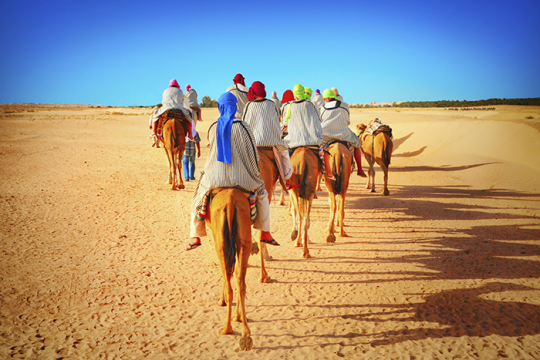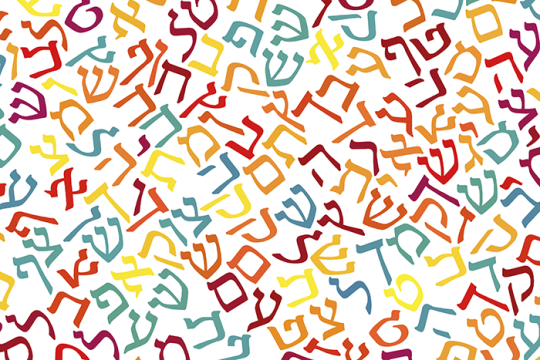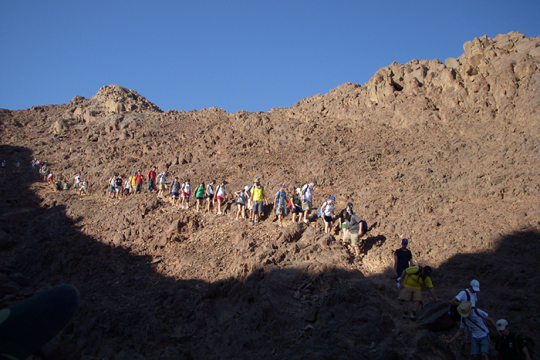How many times do the Ten Commandments appear in the Chumash, the Pentateuch? The obvious answer is two: Sh'mot 20:2 and D'varim 5:6. But when we take apart Vayikra 19, we find our Big Ten again, buried among 18 other positive and negative, ritual and ethical commandments, which together are called the Holiness Code.
The Torah is a great soap opera, but the book of Leviticus, Vayikra, has almost no story line, except the diversionary tale of the zapping of Nadav and Abihu. Even that grim episode does nothing to advance the plot - and the rest of the book - 27 chapters, 10 parshiyot -- is an extended infomercial, heavily tutorial on forbidden sexual relationships and on the law of the sacrifice.
That content so endeared Leviticus to the early Reform rabbis that some chose essentially to ignore it. The exception, the episode that made the cut and even went into reruns, was Chapter 19, the so-called Holiness Code, which, with Chapter 20, makes up Parashat Kedoshim. In Reform temples, we read excerpts from Chapter 19 on Yom Kippur afternoon. Orthodox practice is to read Chapter 16 of Leviticus, establishing Yom Kippur, on Yom Kippur morning, and Chapter 18, detailing the sexual no-nos, in the afternoon. In the ordinary cycle of weekly readings, Chapters 16, 17, and 18, which constitute Parashat Acharey Mot, are paired with Kedoshim; this being a leap year, we read them singly; and with the intervention of Pesach, two weeks apart rather than in consecutive weeks.
As annotated in Pirkei Rav Wikipedia, the parasha contains 28 commandments, 10 positive, 18 negative, including exact or pretty close parallels to the Big Ten of Exodus and Deuteronomy. Of the 28 enumerated in the scroll, only 16 have been carried over into the Reform Machzor. In their disdain for the uncomfortable and no longer directly relevant texts in Leviticus, the editors of the Union Prayer Book and Gates of Repentance chose to spare us, inter alia, the recital of the sexual taboos, the prohibition of shatnez, mixing wool and linen, and even the forbidding of tattoos. Whether the editors of Mishkan T'shuvah, the new Reform prayer book for the High Holy Days, will give back the excisions remains to be seen.
But whether they do or not, just as the study of Torah encompasses all the other obligations without measure, so too all the commandments of Leviticus 19 are contained in the opening salvo: You shall be holy, for I the Lord your God am holy. Everything else describes acts of holiness or forbids acts of decided un-holiness.
Though previous generations of Reform rabbis tended to ignore Vayikra, other traditions made it customary for youngsters to begin their Biblical studies with Vayikra. Why, davka, with Vayikra of all unlikely starting points? The standard answer: small children are pure, and Vayikra deals with purity. But while Vayikra as a whole deals with being pure, tahor, Kedoshim deals with being holy, kadosh. We encounter words built on the root kuf-daled-shin in many guises and contexts - kiddush over wine, kaddish to remember our dead, the kedusha as part of our central t'filah, kiddushin, betrothal, as part of the wedding ceremony, and, lehavdil, to differentiate, in temple times a kadesh was a sodomite, a kedeshah, a prostitute. The root also contains the idea of separation - in kiddushin, the bride separates herself from men other than her husband; in saying kiddush to help inaugurate Shabbat, we separate the holy day from the six ordinary days.
But that still does not answer what it means to be kadosh, holy. And, since kadosh can also be translated as separated, how do we differentiate between kedusha, holiness or separatedness, and havdala, another form of separation, and also between kedusha and tahara, purity? Or does it matter?
The parasha begins You shall be holy, because I Adonai your God am holy. Its penultimate verse says, And you shall be holy unto Me, because I Adonai am holy, and I have separated you from the nations to be Mine.
But it's not all separation. There are some interesting combinations, or at least juxtapositions. In 19:3, Everyone shall revere his mother and father and shall observe my Sabbaths - I am Adonai your God. Here three thoughts are combined -- honor your parents, keep the Sabbath, I'm God. Honor your parents is a commandment bein adam l'chavero, a people-directed mitzvah; keep my Sabbaths is bein adam l'makom, between people and God. The inclusion of I'm God in the same verse suggests that the two are of equal concern to the Divine, and that we not differentiate between the importance of ethical and ritual commandments.
This is reinforced in 19:37: you shall observe all my decrees, mishpatim, and all my ordinances, chukim, and shall do them - I am Adonai. A mishpat, from the same root as shophet, judge, is a law that makes sense, whose meaning we can judge. A chok is one you're to do because I say so, that's why. And we are told to guard then and to perform them. Why? Again, because I'm God.
In 19:3, the three elements of the verse - parents, Shabbos, God - are all re-caps from the Ten Commandments - with one salient difference. The Commandments tell us to honor our fathers and our mothers; here, mothers come first. Per the Rabbis, this shows we are to pay both parents equal respect. We're also taught that one's duty to honor one's parent does not supersede one's duty to keep the Sabbath - again establishing equivalence for the ritual and ethical commandments.
The Big Bang in the Holiness Code is often thought to be Ve'ahavta l're-echa kamocha, you shall love your neighbor as yourself, characterized by Rabbi Akiba as the fundamental principle of the Torah, rephrased by Hillel as the whole Torah on one foot, and later reinforced in another context, with the timely reminder that we must love the stranger for we were strangers in the land of Egypt.
But despite Akiva and Hillel, I choose 19:16 as my fundamental principle:- Do not stand idly by while your neighbor bleeds. When we see something wrong happening, we are required to fix it. Don't just lovingly stand there - do something.
By long-standing custom, at this season we study Pirkei Avot, sometimes rendered in English as The Sayings of the Sages. I see 19:16 as a companion to my favorite mishnah in Pirkei Avot - It is not incumbent on you to complete the task, but neither are you free to desist from it. Rabbi Tarfon, its author, immediately follows up with the reminder that the work is great, the day is short, and the Master of the House is impatient - thus recalling another important statement of Rabbi Hillel -If not now, when?
Thus to be holy may not entail purity, but it does call for separating the right from the wrong, starting now. Reading the Ten Commandments twice, and reading their expanded restatement in Kedoshim, twice, not only repeatedly tell us what's right and what's wrong, but reminds us that bringing the holy into our own lives is our fundamental and ongoing commandment.



